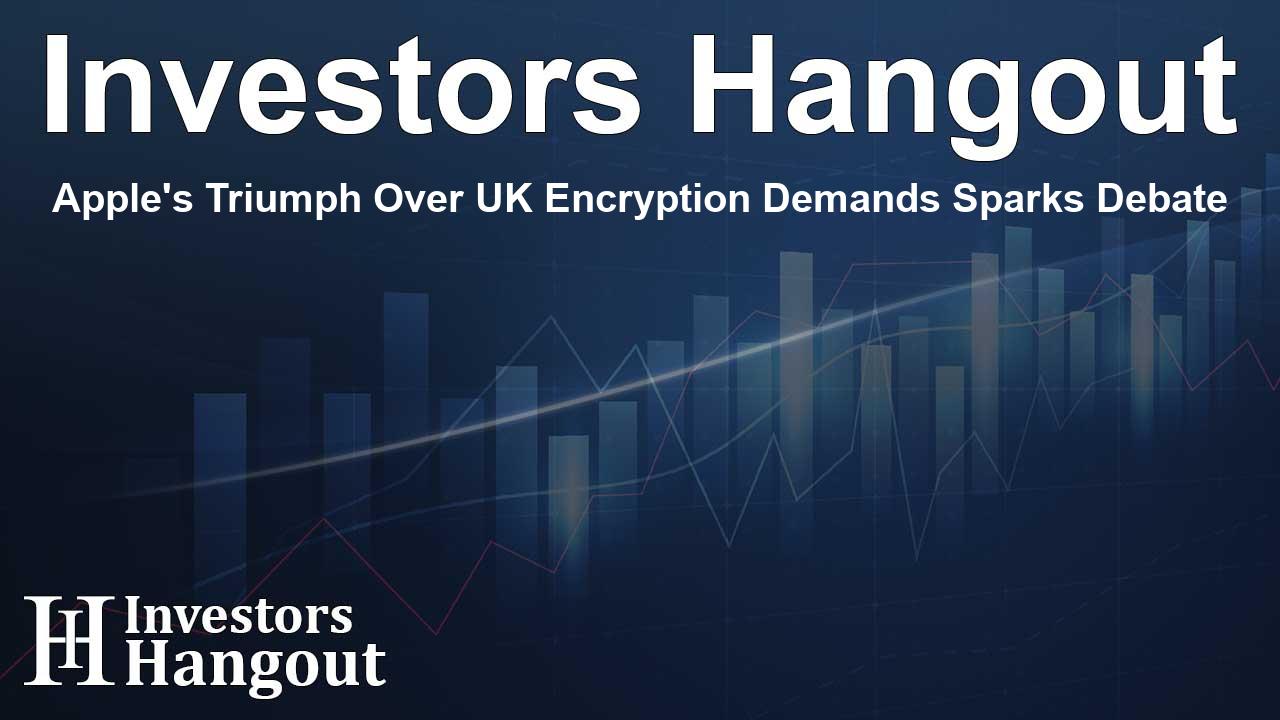Apple's Triumph Over UK Encryption Demands Sparks Debate

UK Withdraws Demand for Apple Encryption Backdoor
In a significant development for user privacy, Apple Inc. (NASDAQ: AAPL) has emerged victorious as U.S. intelligence chief Tulsi Gabbard announces Britain's decision to retract its demand for a backdoor into Apple's encrypted services. This shift comes after sustained discussions between Gabbard, the Trump administration, and British officials.
A Collaborative Effort to Protect Privacy
On her platform X, formerly known as Twitter, Gabbard revealed that she had diligently collaborated for several months to address the dispute regarding encryption. She stated, "The U.K. has agreed to drop its mandate for Apple to provide a ‘back door’ that would have allowed access to the protected encrypted data of American citizens and would have infringed on civil liberties."
Meanwhile, the British Prime Minister was in Washington to hold discussions related to various pressing issues, including Russia's actions in Ukraine. While no official confirmation of the deal was provided by a U.K. government spokesperson, it was mentioned that the country consistently collaborates with the U.S. to tackle security threats while ensuring the protection of civil liberties.
Background of the U.K.'s Order
The discord began when the U.K. Home Office issued a technical capability notice under the Investigatory Powers Act. This order mandated Apple to compromise encryption measures to allow law enforcement access to iCloud backups. Additionally, Apple had previously removed its Advanced Data Protection feature in the U.K., limiting users from fully activating end-to-end encryption.
In response to the escalating demand for backdoor access by governmental authorities, Apple recognized the severe implications of creating vulnerabilities in its encryption. The company has steadfastly maintained that developing backdoors for governmental access would jeopardize overall security and privacy for all users. This position aligns with objections raised by Gabbard and various U.S. lawmakers, who pointed to potential violations of the Cloud Act.
The Cloud Act's Significance
The Cloud Act, enacted to protect the privacy of users in cross-border data requests, prohibits unilateral access demands to citizens' data from either country. This legislation is crucial, particularly in light of the discussions surrounding encryption regulations and data protection. Experts in cybersecurity have echoed Apple's concerns, reinforcing that mandates for encryption backdoors could drastically weaken security frameworks.
Apple's Performance Amid Regulatory Challenges
Despite the backdrop of regulatory challenges, Apple reported impressive revenue of $94 billion during its recent fiscal third quarter, significantly surpassing Wall Street expectations of $89 billion. Earnings per share soared to $1.57, far exceeding the anticipated $1.42. The company's resilience in navigating fiscal hurdles amid regulatory turbulence has drawn considerable attention.
The stock experienced a slight dip of 0.14% in regular trading, with an additional fall of 0.32% in after-hours trading, according to the most recent data. This reflects the market's cautious response to recent developments, though analysts and investors remain optimistic about Apple's overall direction.
Stock Rankings and Market Positioning
Analysts highlight that AAPL continues to demonstrate robust upward momentum across varying time frames. It is essential for investors to keep an eye on the company's performance metrics, as Apple is well-positioned to adapt to ongoing market dynamics and regulatory changes.
Frequently Asked Questions
What triggered the UK to demand a backdoor for Apple?
The UK's decision stemmed from concerns over national security and law enforcement's need to access encrypted data for investigations.
How did Tulsi Gabbard play a role in this process?
Tulsi Gabbard collaborated with the Trump administration and British officials to advocate for privacy and prevent the backdoor requirement.
What does the Cloud Act entail regarding data access?
The Cloud Act protects citizens' data by prohibiting unilateral access demands from one government to another's citizens.
How has Apple responded to government encryption demands historically?
Apple has consistently resisted creating backdoors, arguing it compromises security for all and would be detrimental to user privacy.
What are the implications of Apple's recent revenue report?
Apple's strong fiscal performance indicates resilience amid regulatory scrutiny and reinforces investor confidence in its market strategies.
About The Author
Contact Riley Hayes privately here. Or send an email with ATTN: Riley Hayes as the subject to contact@investorshangout.com.
About Investors Hangout
Investors Hangout is a leading online stock forum for financial discussion and learning, offering a wide range of free tools and resources. It draws in traders of all levels, who exchange market knowledge, investigate trading tactics, and keep an eye on industry developments in real time. Featuring financial articles, stock message boards, quotes, charts, company profiles, and live news updates. Through cooperative learning and a wealth of informational resources, it helps users from novices creating their first portfolios to experts honing their techniques. Join Investors Hangout today: https://investorshangout.com/
The content of this article is based on factual, publicly available information and does not represent legal, financial, or investment advice. Investors Hangout does not offer financial advice, and the author is not a licensed financial advisor. Consult a qualified advisor before making any financial or investment decisions based on this article. This article should not be considered advice to purchase, sell, or hold any securities or other investments. If any of the material provided here is inaccurate, please contact us for corrections.
